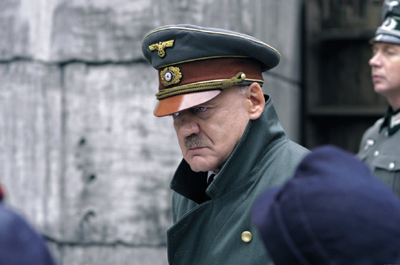

Reviews of Recent Independent, Foreign, & Documentary Films in Theaters and DVD/Home Video
Directed by: Oliver Hirshbiegel. Produced & Written by: Bernd Eichinger, based on the books Inside Hitler's Bunker: The Last Ten Days of the Third Reich by Joachim Fest & Until the Final Hour: Hitler's Last Secretary by Traudl Junge & Melissa Müller. Director of Photography: Rainer Klausmann. Edited by: Hans Funck. Music by: Stephan Zacharias. Released by: Newmarket. Language: German with English subtitles. Country of Origin: Germany. 155 min. Not Rated. With: Bruno Ganz, Alexandra Maria Lara, Corrina Harfouch, Ulrich Matthes, Juliane Köhler, Donevan Gunia & Christian Berkel. DVD Features: Commentary by director Oliver Hirshbiegel. “Making of Downfall” featurette. Cast & crew interviews. Previews.
In the middle of the night, pretty 22-year-old Traudl Junge (Alexandra Maria Lara) is
summoned along with other stenographers for a job interview with the Fuehrer. The
self-effacing dog lover puts the nervous applicant at ease by forgiving her error-prone
dictation. On Adolf Hitler's birthday two-and-a-half years later, Traudl, now his private
secretary, is part of an inner circle entombed in an underground shelter. Enemy artillery
indicates that the Red Army is only 12 kilometers away. The film is less centered on
Traudl, or Hitler, than it is on the broader picture of Berlin under siege, where the
Fuehrer (Bruno Ganz) defiantly remains. Unlike Noah Taylor's recent raving rendition of
Hitler as a tortured young artist in Max, Ganz modulates his performance. Also in
the claustrophobic confines is his mistress Eva Braun (Juliane Köhler), whose
forced joviality barely conceals her hysteria. They are later joined by the Goebbels. The scenes with the fanatical minister of propaganda (Ulrich Matthes), along with his six children and Lady Macbeth-like wife (Corinna Harfouch),
are morbidly fascinating.
The diffused film also follows adolescent Peter (Donevan Gunia), who has destroyed
two Red Army tanks on his own, and Dr. Schenck (Christian Berkel), who is alarmed by
the curtailment of the food supply to wounded soldiers. Instead of evacuating, he
remains with his patients. However, the good doctor comes across as alarmingly naive.
Even to the very end he is shocked by the obstinacy and arrogance of the top Nazi
brass. Meanwhile, Eva Braun's brother-in-law conspires with Heinrich Himmler to
surrender Germany to the Allies.
Downfall straightforwardly depicts Hitler's last days as not to offend. In doing so,
there is no revelatory point of view, except for its curious depiction of Germany as a victim of
the Third Reich. "In a war like this, there are no civilians," declares Hitler, dismissing concern
over the welfare of Berlin's elderly, women, and children. The film's like a checklist of
events. For those not immersed in WWII history, there will bound to be some confusion
regarding the military references and the murky details in the subplots (such as the
plight of Peter's parents).
Throughout, Traudl is almost strictly a passive observer. The film concludes with a jolt,
a clip of an interview with the actual 81-year-old Traudl from the compelling
documentary Blind Spot, made shortly before her death. The brief excerpt is
more succinct and informative than the preceding film. Kent Turner
DVD Extras: Sufficiently entertaining and informative, director Oliver Hirshbiegel, speaking in English, offers
the usual annotations found in most DVD commentaries (behind-the-scenes anecdotes, scene
clarifications, historical notes, etc.) Although he mostly addresses the artistic aspects of the
production, he also deals with the culpability of the German people during the Nazi regime (in
chapter 14).
The making-of featurette is really a collection of cast and crew interviews. Hirshbiegel, for
instance, continuously emphasizes verisimilitude and the dramatic need to humanize Der Fuehrer.
According to him, the challenge was to avoid parody as well as sympathy. Other than a darkly ironic segment about filming on the site of the Siege of Leningrad (now St.
Petersburg), the content here isn’t significantly different from the separate cast and
crew interviews.
Of the five short interviews, Bruno Ganz’s is the most interesting. Whereas the other
actors cogitate on the motivations behind their individual characters (for instance, Juliane Köhler
makes the historically simplistic statement that Eva Braun must have been fun loving and not
interested in politics), Ganz refreshingly eschews speculation and focuses only on himself. Ganz,
in both his individual interview and in the featurette clips, is quite insightful as he discusses his
struggle as an actor to reconcile his disgust for Hitler and his professional fascination with the
character. Like the movie itself, the interviews and the making-of featurette are in German
with English subtitles. George Tan
|